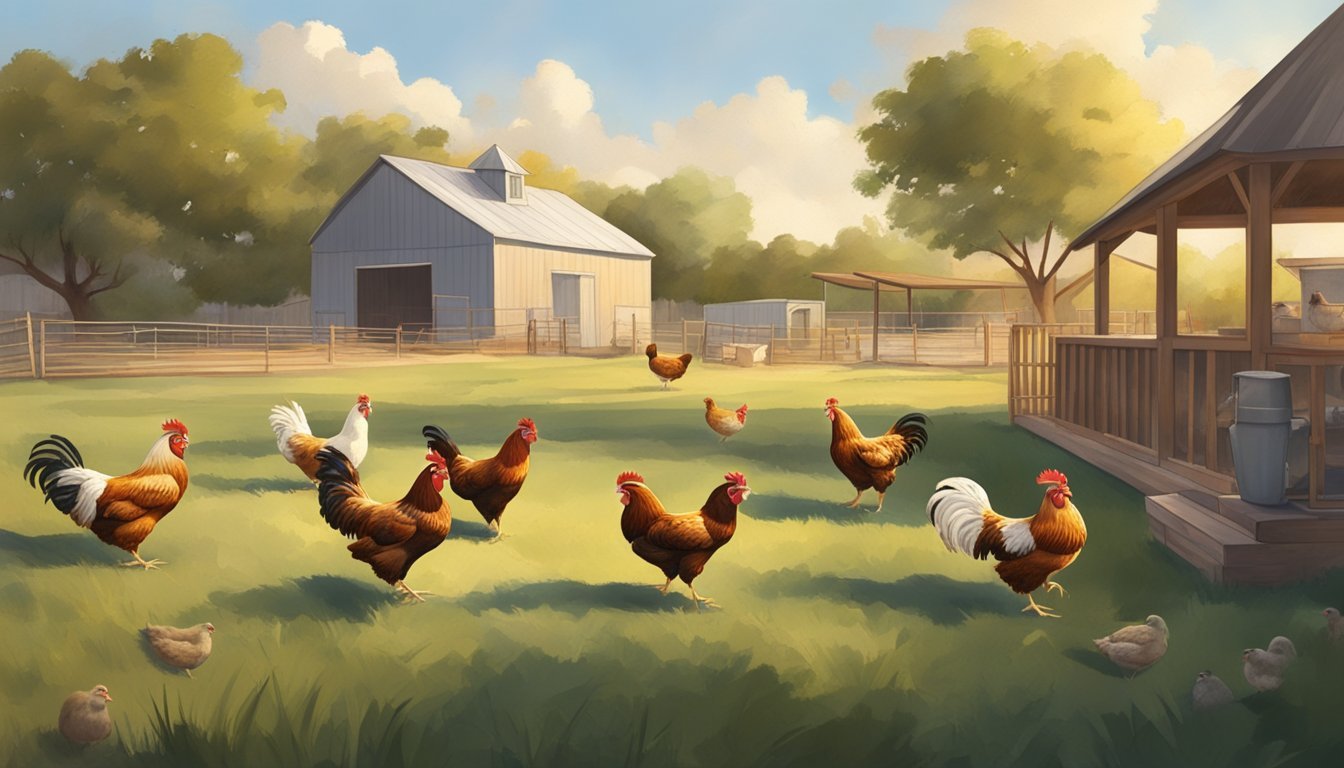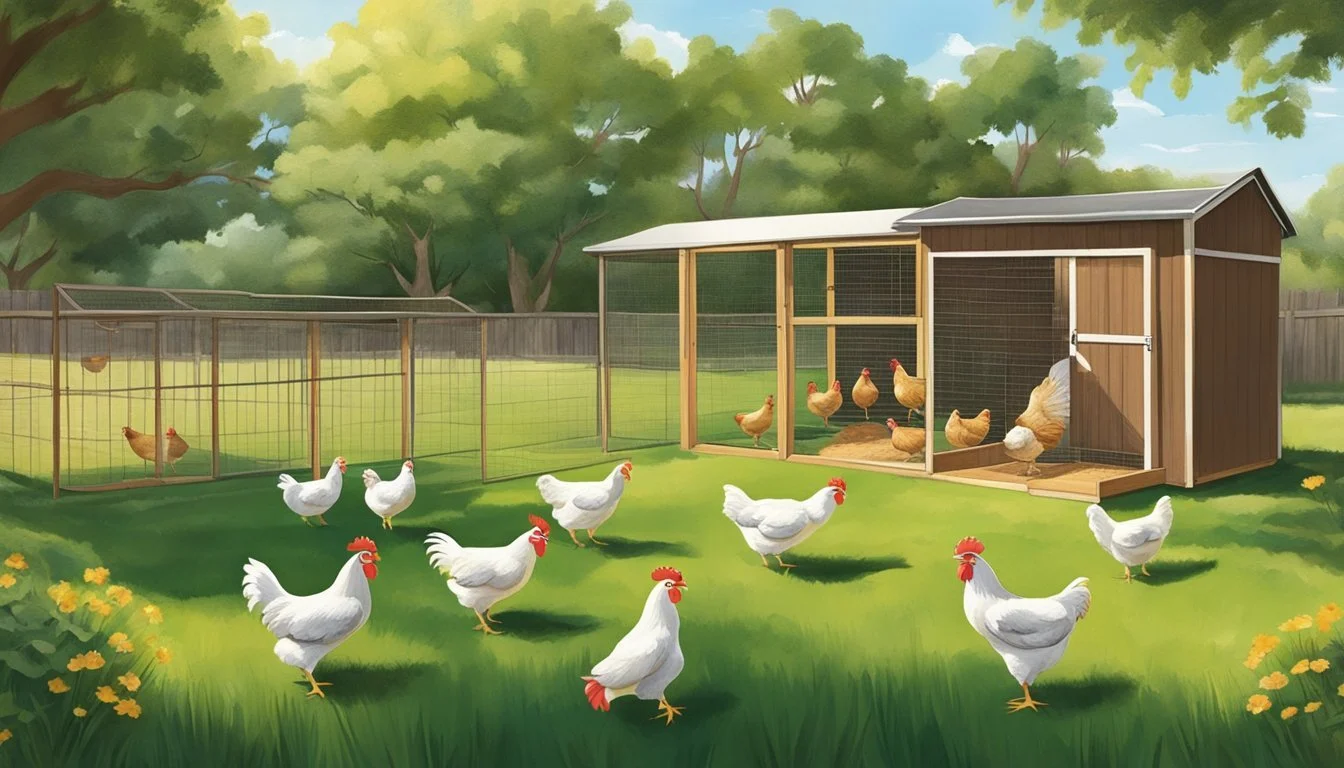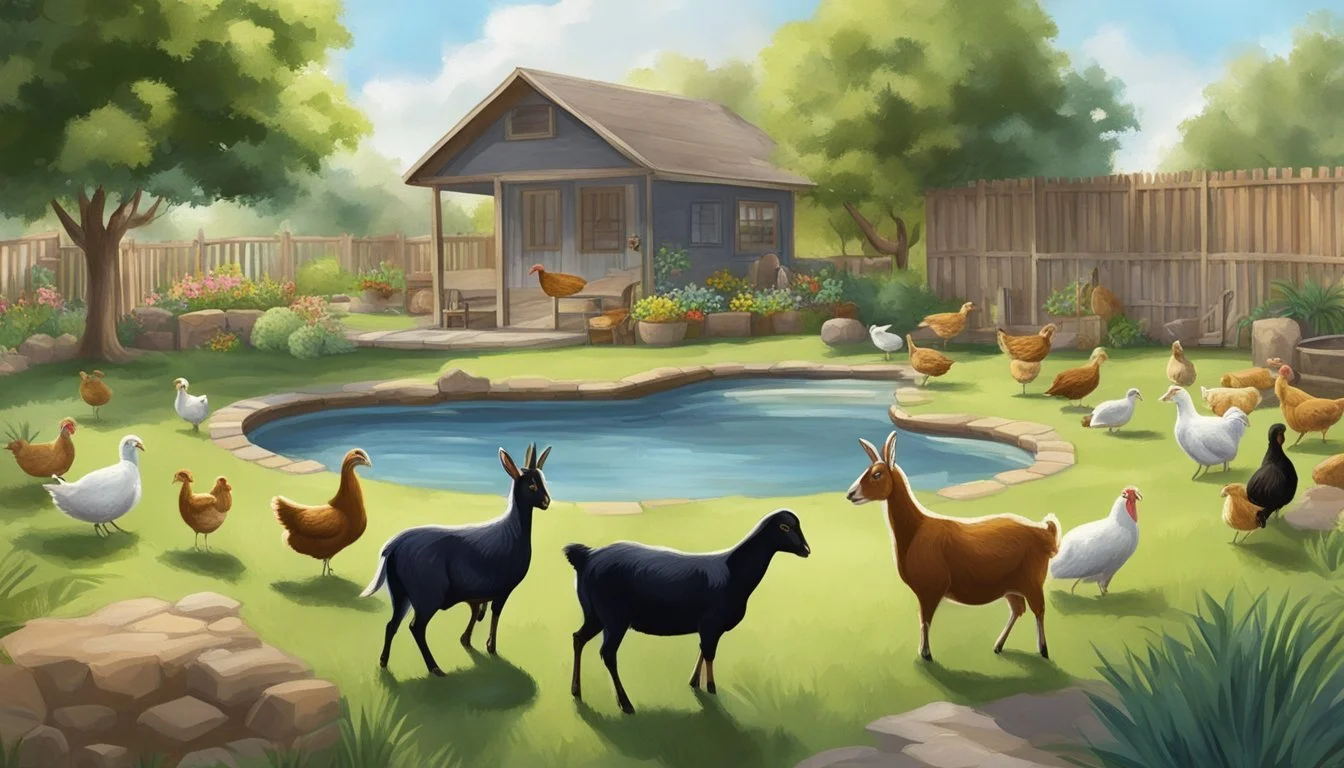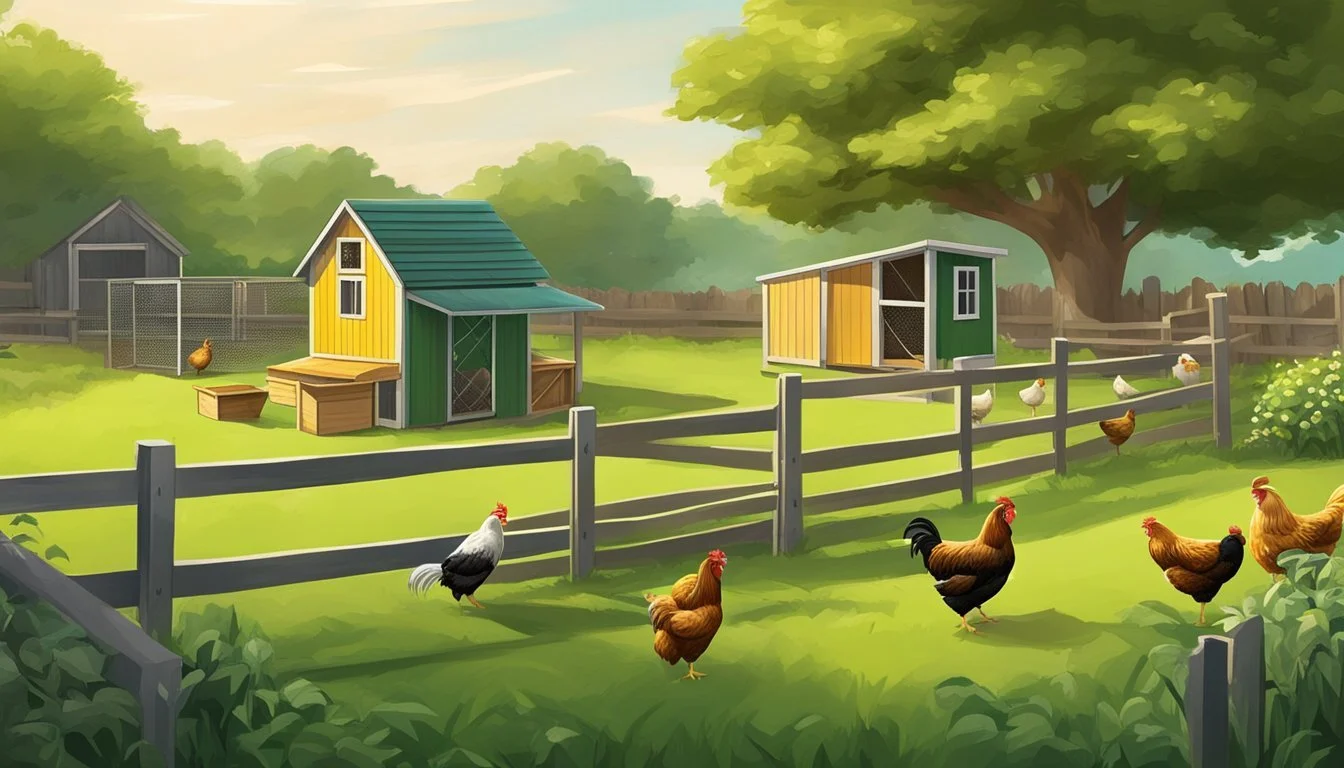Keeping Backyard Chickens in Laredo, TX
Essential Tips for Success
In Laredo, Texas, urban agriculture is taking on new life as residents embrace the practice of keeping backyard chickens. This growing trend caters to those interested in sustainable living, providing fresh eggs, natural garden fertilization, and the joy of caring for these animals. Municipal regulations are in place to ensure the health and safety of both the chickens and the community, allowing residents to enjoy the benefits of raising poultry within city limits.
Residents of Laredo are allowed to keep up to four chickens under the city's guidelines, fostering a manageable approach to backyard poultry farming without overwhelming urban environments. A critical stipulation for those interested in housing more than four birds is the requirement of a 100-foot coop setback from property lines, maintaining adequate distance to mitigate any potential nuisances to neighbors.
While individual neighborhoods may have additional specifications, these rules help balance the interests of budding poultry keepers with the welfare of the surrounding community. Prospective chicken owners are advised to consult with city officials to navigate the specifics of local ordinances, ensuring their backyard coops meet all necessary standards. Such dialogue upholds the integrity of local laws while promoting a cooperative spirit among residents looking to integrate chickens into their Laredo homes.
Understanding Local Ordinances
Local ordinances are critical for residents of Laredo, Texas, when considering the practice of keeping backyard chickens. These local laws determine the feasibility and guidelines for raising poultry within city limits.
City Ordinances in Laredo
In Laredo, the city ordinances specify that residents may keep up to 4 chickens. However, owning more than four chickens necessitates a substantial coop setback of 100 feet. It's essential to adhere to local regulations to avoid penalties, which can include fines for noncompliance with standards pertaining to noise, odors, or sanitation issues. Individuals are encouraged to consult city officials for specific rules that may apply to their neighborhood.
Surrounding Texas Cities' Regulations
Regulations on backyard chickens vary from one Texas city to another, often reflecting the community's stance on urban agriculture. Here are some examples highlighting the differences:
Fort Worth: Regulations are more relaxed, allowing a greater number of chickens without a permit.
Arlington & Plano: More stringent guidelines exist, with specific requirements on coop placement and care.
Grand Prairie & Mansfield, TX: Maintaining backyard chickens is allowed but with conditions to address potential nuisances.
Corpus Christi, El Paso, & Galveston: These cities have their unique frameworks that can include restrictions on the number of chickens, coop constructions, and the handling of waste to curb noise and odors.
Individuals should review the local ordinances specific to their city for a comprehensive understanding of what is permissible. This includes checking for any updates to municipal codes that might affect chicken keeping.
Designing the Right Chicken Coop
When constructing a chicken coop in Laredo, TX, it's essential to focus on space optimization, predator defense, and climate control to ensure the health and safety of the chickens.
Space and Comfort
The coop should provide sufficient room for each chicken to move, stretch, and access nesting boxes comfortably. A general guideline is to allocate at least 2-3 square feet of coop space per chicken. In smaller backyards, vertical designs with multi-level perches can enhance space efficiency without compromising the chickens' comfort.
Minimum Dimensions: 2-3 sq ft per chicken
Enhancements:
Nesting boxes: 1 per 3-4 hens
Multi-level perches
Safety and Protection From Predators
Protection against predators is critical for backyard coops. In Laredo, common predators may include raccoons, foxes, and birds of prey. The coop should be constructed with sturdy materials and fitted with hardware cloth rather than chicken wire, as it is more durable. All entrances, including windows and vents, should be secured against intrusions. Additionally, a predator-proof chicken run provides safe foraging space.
Materials: Hardwood, hardware cloth, secure locks
Features:
Buried wire skirts to prevent digging under coop walls
Lockable doors and windows
Ventilation and Temperature Control
Optimal ventilation is crucial to prevent respiratory issues and control temperature. In the hot Laredo climate, adequate air flow helps keep the coop cool, while insulating materials can shield chickens from extreme heat. Eaves and vents should be placed strategically to ensure continuous air exchange even when the coop is closed.
Ventilation:
Eaves
Roof vents
Window vents with predator-proofing
Properly designing a chicken coop ensures that chickens have a comfortable, secure, and healthy environment, which ultimately leads to a more successful and satisfying backyard farming experience.
Daily Care and Management
Proper daily care and management are crucial for the health and well-being of backyard chickens in Laredo, TX. Focus on a balanced diet, routine health checks, and ample space for exercise to ensure a productive flock.
Feeding and Nutrition
Chickens require consistent access to food and water. A balanced diet typically includes grains, proteins, and essential minerals. Owners should provide:
Grain: A mainstay of chicken diets, often available as commercial poultry feed.
Protein: Crucial for egg-laying hens to maintain optimal production.
Grit: Helps chickens digest their food, as they don't have teeth to chew.
Water dispensers need to be checked and refilled daily to ensure chickens have continuous access to clean water.
Health Monitoring and Veterinary Care
Regular health assessments are vital in detecting early signs of sickness or distress. Owners should monitor for:
Behavioral Changes: Unusual behaviors can be early indicators of health issues.
Physical Symptoms: Such as changes in feather condition, lesions, or lethargy.
Veterinary care should be sought for any concerns to maintain the flock's health. Preventative measures, such as vaccinations and parasite control, are also important.
Exercise and Free-Range Practices
Exercise is important for a chicken's health. Providing space for free-range activities benefits chickens by:
Encouraging Natural Behaviors: Like foraging, which is beneficial for their physical and mental health.
Reducing Stress: Which can otherwise negatively impact egg production and overall health.
A secure enclosure is necessary to protect the flock from predators while allowing them ample room to move freely.
Breeding and Raising Chickens
When breeding and raising chickens in Laredo, TX, residents must be cognizant of local ordinances and provide proper care for the health and welfare of the poultry. Chickens need a safe environment, and their keepers should understand the dynamics of a flock.
Raising Chicks
Raising chicks requires a controlled environment to ensure their safety and healthy development. Brooders—specialized heated spaces—are essential for chicks in their first weeks of life. A brooder provides warmth which is crucial, as chicks are unable to regulate their body temperature effectively. Temperatures should start at approximately 95 degrees Fahrenheit and decrease by 5 degrees each week until the chicks are fully feathered. They must also have access to clean water and starter feed, which is specifically formulated to meet the nutritional needs of growing chicks.
Chicks need:
Environment: 95°F for the first week, decrease 5°F weekly
Nutrition: Ample starter feed, high in protein
Hydration: Constant access to clean water
Space: At least 2 square feet per chick to prevent overcrowding
Protection: A secure brooder to prevent predation and escape
Managing Flock Dynamics
In managing flock dynamics, the presence of roosters can influence the behavior and hierarchy within a chicken community. While roosters can offer protection against predators, they may also cause tension and crow, which may be a consideration for those raising chickens in residential areas. In Laredo, homeowners need to maintain compliance with local ordinances, which allow up to four chickens without a requirement for the 100-foot coop setback that comes with larger flocks. This often effectively limits urban chicken owners to a hen-only flock, as roosters are typically prohibited to minimize noise.
As chickens grow, the flock will establish a pecking order. It is important for chicken keepers to monitor their flock to prevent excessive pecking and bullying, which can be more prevalent in confined spaces. Providing enough space, perches, and resources can help alleviate these issues. Regular checks for illness and injuries are also vital to maintain the well-being of the flock.
Flock management essentials:
Rooster Considerations: Understand local laws on rooster ownership; consider noise and flock behavior
Space: Adequate coop space to reduce stress and pecking
Resources: Sufficient food, water, and perches for the number of chickens
Monitoring: Regular observations for signs of bullying or illness
Community Engagement and Legal Compliance
Understanding the local ordinances and maintaining a good relationship with neighbors are crucial steps for Laredo residents looking to keep chickens in their backyards.
Dealing With Neighbors and HOA
When it comes to backyard chickens, positive neighbor relations can prevent a variety of issues. Residents should inform their neighbors about their intention to keep chickens and be prepared to address any concerns regarding noise, smell, and potential pests. Homeowners associations (HOA) often have their own set of rules that may be stricter than city ordinances. Prior to setting up a coop, chicken owners should consult their HOA agreements to ensure compliance with specific regulations.
Tips for approaching neighbors and HOA:
Communicate: Inform them of your plans and discuss how you intend to manage the chickens responsibly.
Listen: Understand and address their concerns proactively.
Offer Assurance: Explain the measures you’ll take to minimize disturbances, such as adhering to noise ordinances and maintaining coop cleanliness.
Handling Complaints and Avoiding Penalties
Residents must adhere to local laws to avoid complaints and penalties. In Laredo, the maximum number of chickens allowed is four, and if more than four birds are kept, a 100-foot coop setback is required. Non-compliance could lead to fines or other penalties. To prevent complaints:
Keep the number of chickens within the legal limit.
Ensure the coop is well-maintained and clean to mitigate odor and noise.
Make certain that chickens have a secure, enclosed area for exercise and safety.
In the event of complaints:
Respond Promptly: Address concerns immediately to show good faith efforts.
Documentation: Maintain records of your compliance with city regulations.
City Consultation: If necessary, consult Laredo city officials to resolve any misunderstandings.
By understanding and observing these guidelines, residents can enjoy the benefits of keeping chickens while maintaining a harmonious community environment.
Beyond Chickens: Other Backyard Livestock
While chickens are a popular choice for backyard livestock in Laredo, Texas, residents have the option to explore other kinds of poultry and larger farm animals, depending on the space available and city regulations.
Ducks and Geese
Ducks and geese are viable alternatives to chickens and can be a rewarding addition to a backyard homestead. They require access to water for swimming and cleaning their feathers, which can be accommodated with a small pond or a large tub of water. Before adding ducks or geese to a backyard, one must ensure that local ordinances allow for such poultry and that the space is adequate to prevent overcrowding and maintain hygiene.
Ducks:
Waterfowl known for their egg-laying abilities.
Generally require less maintenance than chickens.
Geese:
Can serve as natural "guard animals" due to their protective nature.
May require more space than chickens or ducks.
Larger Livestock Options
For those with sufficient land and proper zoning permissions, larger livestock such as sheep, goats, and even horses can be suitable for a backyard farm setting. These animals require more space, infrastructure, and resources for their care. They provide various benefits, from wool production in sheep to natural weed control from goats.
Sheep:
Beneficial for wool and can contribute to lawn maintenance.
Require adequate fencing to prevent wandering and to provide protection from predators.
Goats:
Known for their ability to clear brush and weeds.
Need sturdy fencing and enrichment to prevent escape and boredom.
Horses and Mules:
Require significant land, shelter, and daily care.
Offer companionship and potential for recreational riding.
When considering backyard livestock, it's crucial to understand not only the city regulations but also the commitment to animal welfare and the responsibility of maintaining healthy living conditions for all animals involved.
Resources for Backyard Chicken Keepers
For those in Laredo, Texas, deciding to keep backyard chickens requires understanding local regulations and accessing the right resources. Knowledge and preparation are essential for successful and lawful chicken keeping.
Educational Material and Community Forums
The United States Department of Agriculture (USDA) provides a wealth of information that is particularly useful for new poultry keepers. They offer guidelines on the care, feeding, and housing of backyard poultry, ensuring that keepers adhere to safety and health standards.
In Laredo, chicken keepers can communicate and share experiences through local online forums. Here they can receive advice on the nuances of keeping chickens in their specific city, such as local chicken laws and regulations pertaining to Laredo. It's crucial for residents to be aware that they can keep up to a specific number of chickens, and they must maintain certain distances from neighboring properties.
Local Supplies and Equipment
When it comes to buying supplies and equipment, several local stores in Laredo and nearby chicken-friendly cities like Austin, Dallas, Houston, and San Antonio can provide everything needed for backyard chickens, including:
Coops and Enclosures: Units that ensure chickens are secure and have adequate space.
Feeding and Watering Equipment: Essential items to maintain proper nutrition and hydration.
Health and Wellness Supplies: Offers a range of products for the wellbeing of the chickens.
Local stores not only offer the physical goods but often provide valuable advice on how to use them effectively and in compliance with local regulations. It's important for residents to support these establishments to promote a thriving community of backyard chicken enthusiasts in Laredo and its surrounding areas.









